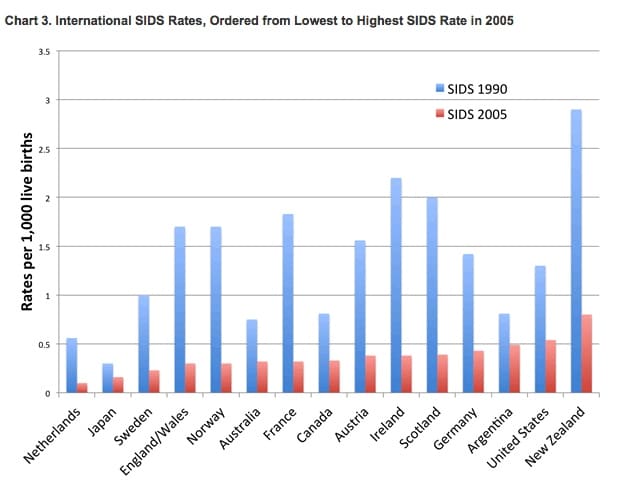What is SIDs?
SIDS, an unexplained infant death resulting from an unknown medical abnormality or vulnerability is usually classified a natural death. Accidental suffocation, a death resulting from full or partial airway obstruction causing death from oxygen deprivation and increased carbon dioxide, is classified as accidental. In most cases of sleep-related infant death, it is impossible to make a definitive classification of SIDS vs. accidental suffocation. Autopsy findings are similar and death scenes often reveal possible asphyxiating conditions, such as prone sleep or co-bedding, without clear evidence of airway obstruction.
In the United States in the last 20 years there has been a decrease in deaths classified as SIDS and an increase in those classified as accidental suffocation. Sleep-related deaths have leveled off at about 4,000 each year.
One theory is that most sleep-related deaths are caused from a combination of infant vulnerability and asphyxiating conditions and can be seen as existing on a continuum of highly vulnerable infant/safe environment to normal infant/highly asphyxiating environment.

|
Causes of SIDs
Other sleep related causes of infant death.
- Suffocation: When something, such as a pillow, or someone covers the baby's face and nose blocking off the ability to breate.
- Entrapment: When a baby gets trapped between two objects such as a wall and mattress and can't breathe.
- Strangulation: When something presses or wraps around a baby's neck, blocking airway.
|
How to prevent SIDS
- Decrease infant's medical vulnerability. This is only possible through increased medical research to understand such things as genetic abnormalities, brain abnormalities, prematurity and other pregnancy related medical risks.
- Keep the child's airway clean. Avoid prone (stomach) sleep, bed sharing and cluttered sleep surfaces.
- Don't do anything to decrease the infant's arousal. Avoid prone sleep, bed sharing, over-heating, and sedation. Avoid risks of infections.
- Don't do anything to decrease the parent's arousal. Avoid situations leading to exhaustion as well as alcohol & drug sedation.
|
Reduce the risk of SIDs by following these Guidlines
Before Baby is Born
Get good early prenatal care. A healthy full-term baby is more likely to live past infancy.
Do not use cocaine or heroin during pregnancy or prescription drugs not prescribed by your doctor.
Do not smoke cigarettes during pregnancy.
Do not become pregnant during your teen years.
If you are a teen and already have one child, wait until adulthood to have another. A second infant born to a teen mother is especially at high risk.
|
After Baby is Born
Do not fall asleep with your baby in your bed. If you breastfeed, be sure to place baby back in his crib before dosing off.
Do not allow the baby to sleep with other children. Babies should never bed-share with children or adults.
Use a bare crib with a firm mattress. Put nothing in the bed but the baby and the clothes needed to stay warm but not too warm. Don't use pillows, positioning devices, blankets or other cover. Remove bumper pads from baby's crib. Make sure nothing can ever get close to his face. There is evidence that rebreathing (inhaling the air that was breathed out) can affect the infant's arousal.
Keep your baby's crib in the parent's room until he is at least 6 months of age and has learned to easily roll both ways on his own.
Babies should be safely put in a bare crib on their backs even when they are fretful, have a cold, or are otherwise needing extra comfort. Just keep the crib close to you and you will both be comforted. Babies with colds are at higher risk for sudden infant death.
Do not allow anyone to smoke around the baby. Do not have your baby in a room or car where people have recently been smoking.
Offer your baby a pacifier. For breastfeeding mothers, introduce the pacifier after the baby has learned to feed. Do not attach the pacifier to the baby or crib since it can cause a choking hazard. Several studies have found a lower risk of sleep-related death when babies use a pacifier.
Breast-feed your baby. This can lead to an overall healthy baby and may help soothe a fretful baby.
Some mothers learn that putting babies on their stomachs may make them cry less. And while that is true for many, if not most babies, it is dangerous and puts babies at higher risk for sleep-related deaths.
Give your baby plenty of interactive tummy play-time. This should never be in a bed. A good place for this is on a play mat on the floor. Never leave him on his stomach unattended. Play with him as he does his baby push-ups.
When you travel with your baby, be sure to plan a safe place for him to sleep. Call ahead to the hotel to make sure they have safe cribs available or take your own portable crib.
Do not put too many clothes on the baby or keep him/her in a room that is too hot. If the baby is sweating, remove some of the clothing.
If your baby has periods of not breathing, going limp or turning blue, tell your pediatrician at once. And if your baby stops breathing or gags excessively after spitting up, discuss this with your pediatrician immediately.
Thoroughly discuss each of the above points with all caregivers.
If you take your baby to daycare or leave him with a sitter, provide a copy of this list to them. Make sure they follow all recommendations.
|
  |
|